âDawn Treaderâ Film May Hit Story Sandbars, Part 1
 First Disney dropped distributing the Chronicles of Narnia film franchise. Then Fox picked it up.
First Disney dropped distributing the Chronicles of Narnia film franchise. Then Fox picked it up.
Then it seemed that producer Walden Mediaâs new director, Michael Apted, might bring a better story adaptation. But a leaked script emerged that included some rather gross perversions of C.S. Lewisâs original story. Yet the producers said that was not the filmâs current script.
More recently have come the film trailers that contain even more divergent content. You can view the most recent trailer linked in last Fridayâs column, or this trailer, to see what I mean.
Last weekend I returned to the NarniaWeb podcast, hosted by âRilianâ and in this episode costarring âGlumPuddleâ (who has a hilarious video rundown of the recent trailer), âWarrior 4 Jesusâ and me. Apparently the final mix isnât yet finished [edit: now it is; download it here], but in that podcast many of us expressed worry about the film â not primarily because it has clearly changed some of the story, or at least added a kind of âflashbackâ to the White Witch (again). Rather, we were concerned that the bookâs central themes will be overridden by modern-focused fantasy shtick.
It would be great to get a disclaimer, but that same notion seems reflected in a quote last week from director Apted himself (which is repeated, with source, in that same Friday column).
Below Iâll quote myself (with some edits) about Apted and the filmâs adaptation, not because I think I said it best, but because so far my voice track is the only one I have from the recording.
The problem is something that you identified earlier, Rilian. You called it a âphilosophical difference,â that the quote really kind of cuts to a philosophical difference between the book, and perhaps whatâs sounding like (without qualification) the movie adaptation.
I want to be really cautious, and I donât want this to sound mean when I use C.S. Lewisâs phrase chronological snobbery. There was a little of that in the last film [Prince Caspian], and even a little bit less in The Lion, the Witch and the Wardrobe; it wasnât too bad. But itâs a very subtle attitude that goes like, âHey, weâre too cool for this stuff. We need to put in some modern stuff. You know, weâre in on the joke. This is just a nice little story. But we need to make it more like Star Wars or Harry Potter.â
Thatâs kind of the giveaway there. And while I like Star Wars, and I like Harry Potter even more â thatâs Star Wars, and thatâs Harry Potter. Let them be them, and let Narnia be Narnia.
Why canât we just tell the story? Maybe punched up a little bit â I donât mind some filling out the details. They did some of that in The Lion, the Witch and the Wardrobe. I donât mind changing the order of the islands around. Heck, I could even get used to the Seven Swords, maybe Star Girl if I was really relaxed. But to revise things to this extent â at the very least, Iâd like to hear a qualification going [for Aptedâs quote]: âHereâs what I meant by that. Hereâs what I did not mean. And we are going to try to meet the themes of the book. Weâre not just trying to be another Star Wars, and weâre not trying to be Harry Potter, where all these details mesh together, we have all these little subplots where everythingâs got to connect, and we have to imitate the other guy.â
Another term for [the main story] thatâs used in novels and such is metanarrative. You need to understand your metanarrative. You can play with the subplots a little bit, but thereâs at least three main metanarratives in The Voyage of the Dawn Treader that have to be adhered to, or else itâs not The Voyage of the Dawn Treader.
[They must get] those three right, and make them the main thing. You canât just kind of give a polite nod and a salute in that direction, then go off on a quest for seven swords.
Please, I donât mind the seven swords, Mr. Apted (I know youâre listening) but make sure to keep the main thing the main thing. [Otherwise] itâs like opening the Bible and getting all lost about trying to figure out who the Nephilim are, from Genesis 6, instead of, oh yeah, thereâs this whole Flood there. Letâs keep the main story the main story.
Recently I was reading a article in a Christian magazine [Narnia Invaded by Stephen J. Boyer, TouchStoneMag.com, 2010] about how Prince Caspian in particular, while they had to change the story, they had made all kinds of alterations and had completely failed to understand Lewisâs approach toward authority, the kingly role in Narnia, and how that changes you, and how authority doesnât make you into a bully that wants to go start fights in a subway station. It makes you more noble than that. And I understand how they wanted to change that. But I just havenât seen a whole lot that is different from that previous approach. And this quote seems to undergird that. Itâs like âweâve got to change that, weâve got to update it, weâve got to fill in the gaps,â and even more than filling in the gaps, âweâve got to find a new big story that ties it all together.â
But for Voyage of the Dawn Treader, you already have three big stories. To me, theyâre:
- Reepicheepâs quest, which is closely allied with,
- Finding Aslanâs Country â thatâs perhaps the biggest one â which of course is closely allied with,
- Eustaceâs transformation.
If they get those three right â and I havenât seen anything that contradicts that at least Eustace will have a good âun-dragoningâ (a March 2 Christianity Today article) â if they get those three things right, I donât even mind them rehashing the White Witch. But they have to get those three elements right. That will make a good film, and that will make a film that honors The Voyage of the Dawn Treader book.
Next week: an overview of my original hopes and expectations for the film, listed in part 1 and part 2 of my column last year, and whether the current film may meet them.



































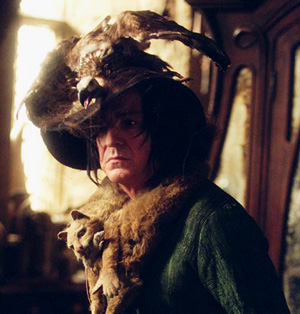
 A certain âholidayâ is coming up, and recently I read one of the best columns Iâve ever found on the subject. This comes from
A certain âholidayâ is coming up, and recently I read one of the best columns Iâve ever found on the subject. This comes from 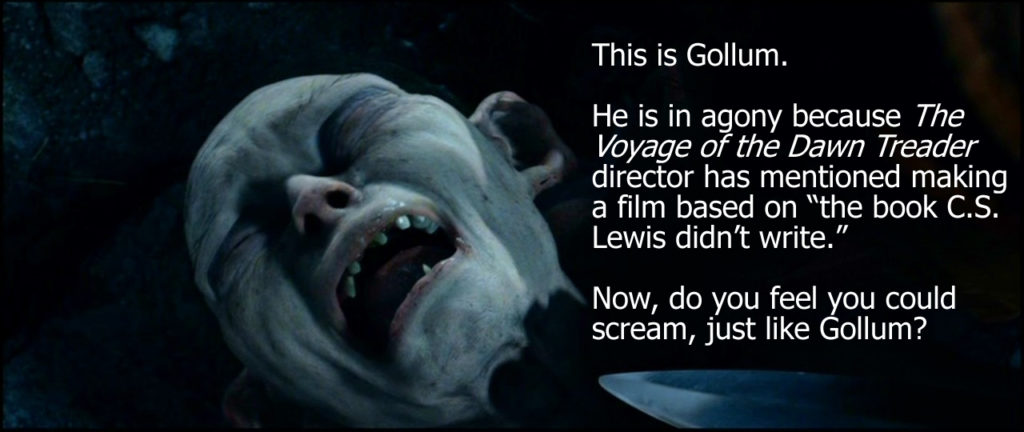
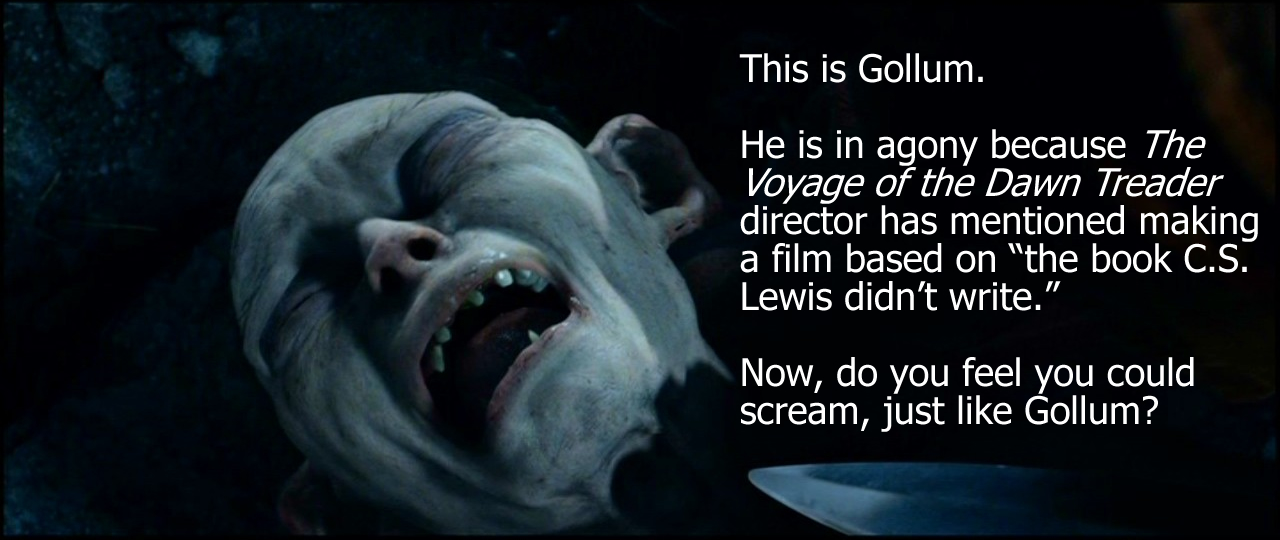

 âGromit, thatâs it! Cheese! Weâll go somewhere where thereâs cheese!â
âGromit, thatâs it! Cheese! Weâll go somewhere where thereâs cheese!â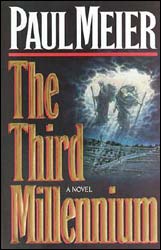 âAn international computerized banking system will be located in Rome for our central banking system. [⊠W]e will be using the ancient Babylonian system for numbering names. [âŠ] Since I am founding the system, I am asking that all social security numbers be preceded by 666 despite the silly superstitions surrounding that number.
âAn international computerized banking system will be located in Rome for our central banking system. [⊠W]e will be using the ancient Babylonian system for numbering names. [âŠ] Since I am founding the system, I am asking that all social security numbers be preceded by 666 despite the silly superstitions surrounding that number.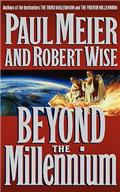 Meanwhile, in Hell, two wisecracking demons are summoned by The Devil to do their best to wreck the humansâ lives and cause general recalcitrance and consternation. Their dialogue is evidently taken straight out of a Warner Brothers cartoon short starring Daffy Duck, only with less subtlety.
Meanwhile, in Hell, two wisecracking demons are summoned by The Devil to do their best to wreck the humansâ lives and cause general recalcitrance and consternation. Their dialogue is evidently taken straight out of a Warner Brothers cartoon short starring Daffy Duck, only with less subtlety.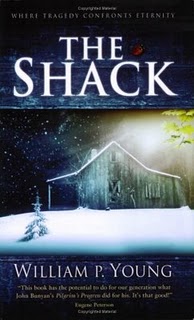 Instead of writing like his favorite authors, though, [the author] simply asserts in his own sentences the effects that their writing has on him. The result is oppressive, as in the description of a tree that the character Mack crashes into: As he lies prone and looks up into the tree, it is said âto stand over him with a smug look mixed with disgust and not a little disappointment.â Take a moment right now, reader, to see if you can arrange your face into an expression that communicates smugness mixed with disgust and disappointment. You will find it ânot a littleâ impossible, and you have greater expressive range than trees. (From
Instead of writing like his favorite authors, though, [the author] simply asserts in his own sentences the effects that their writing has on him. The result is oppressive, as in the description of a tree that the character Mack crashes into: As he lies prone and looks up into the tree, it is said âto stand over him with a smug look mixed with disgust and not a little disappointment.â Take a moment right now, reader, to see if you can arrange your face into an expression that communicates smugness mixed with disgust and disappointment. You will find it ânot a littleâ impossible, and you have greater expressive range than trees. (From 
 Greetings, Earthlings and other denizens of the internet-enabled universe. My name is Cathi-Lyn Dyck, and I am a highly unorthodox individual.
Greetings, Earthlings and other denizens of the internet-enabled universe. My name is Cathi-Lyn Dyck, and I am a highly unorthodox individual.


